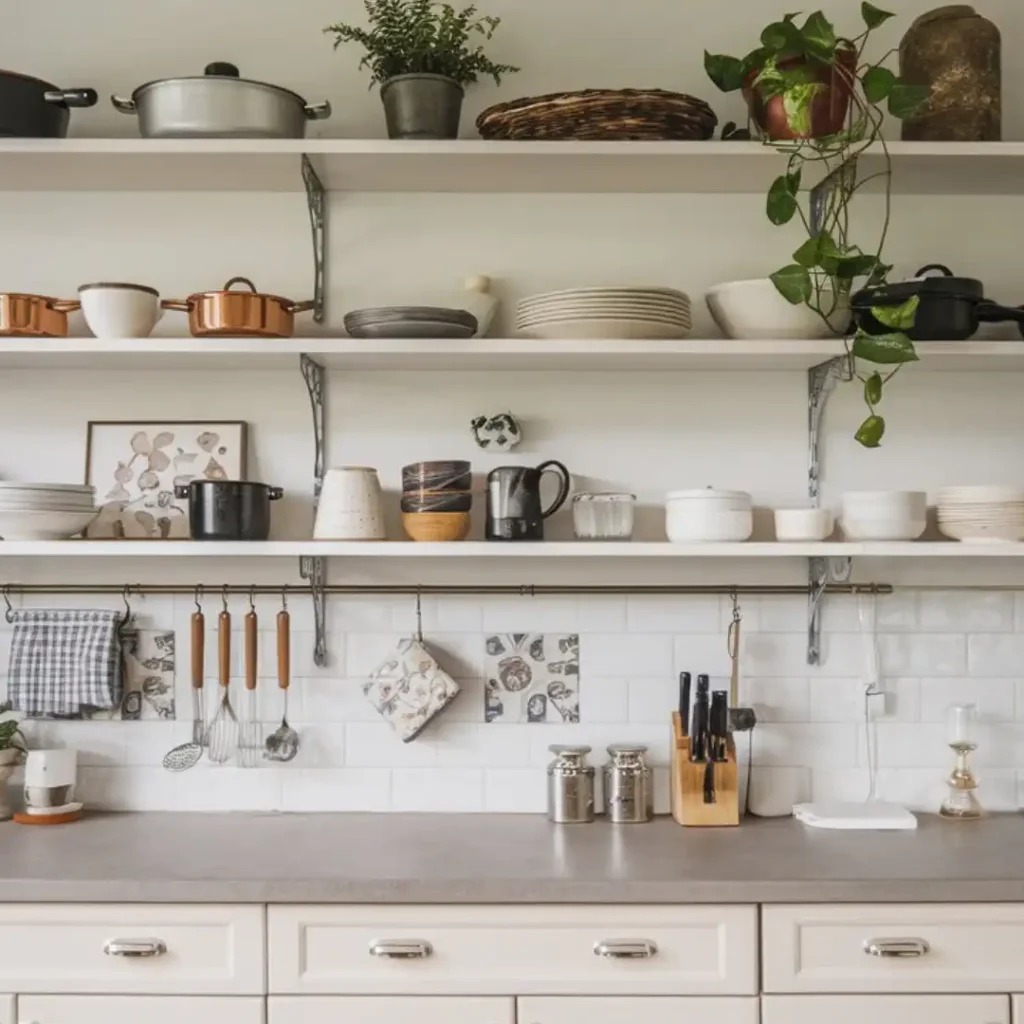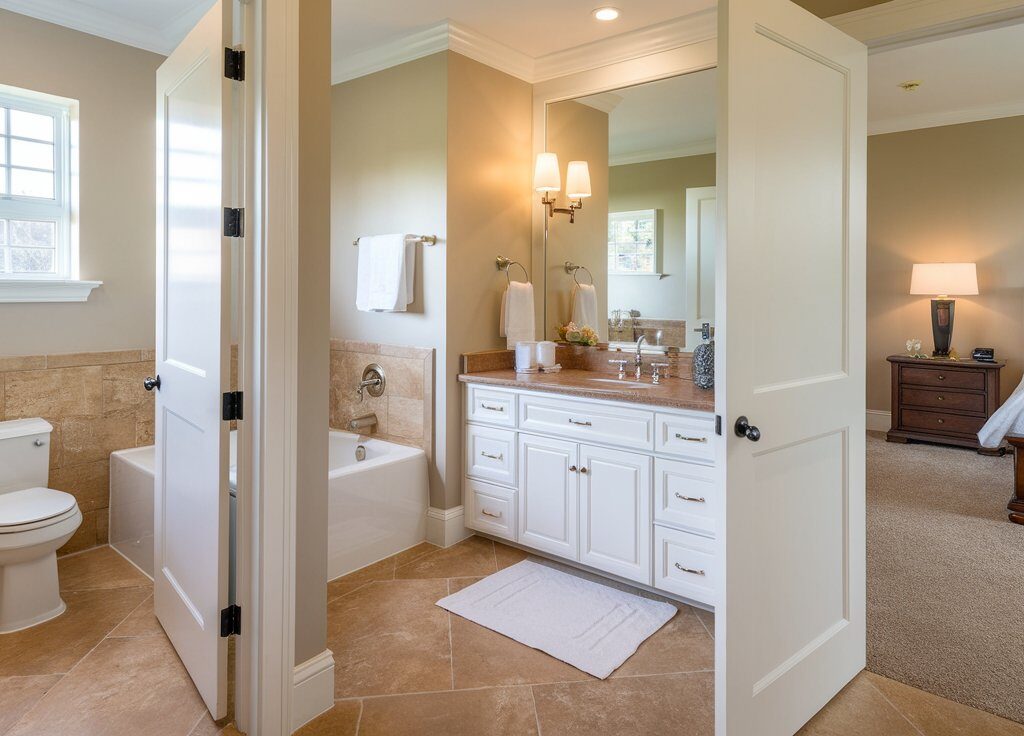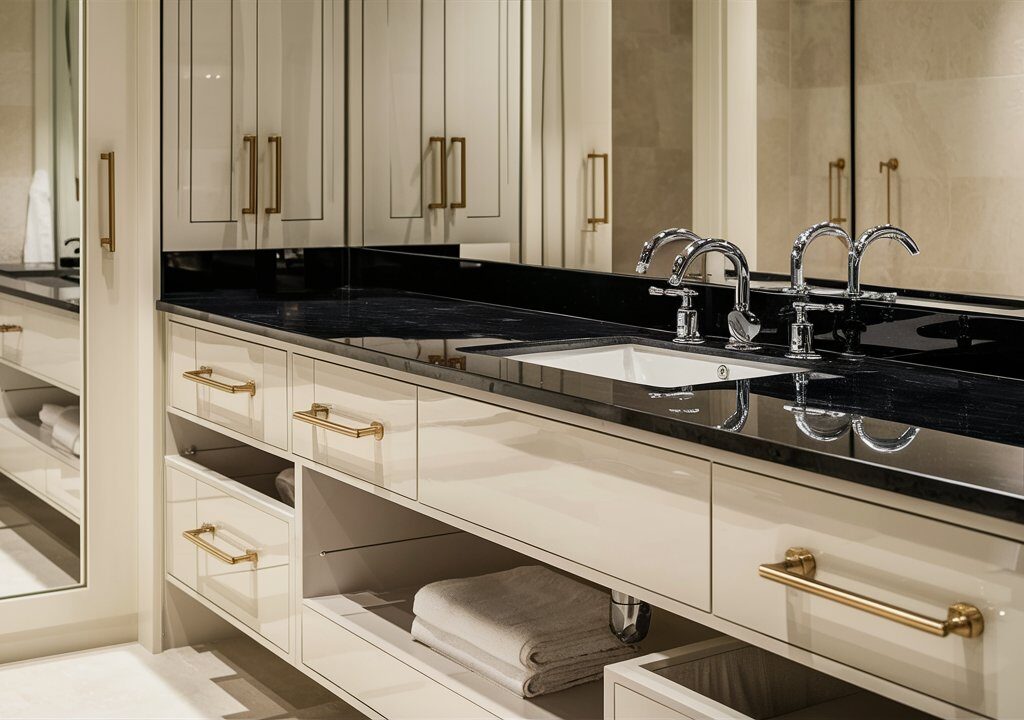- Open Kitchen Shelving
- Benefits of Open Kitchen Shelving
- Preparing Your Kitchen for Open Shelving
- Decluttering and Categorizing
- Design Concepts for Open Kitchen Shelves
- Minimalist vs. Maximalist Approaches
- Color Schemes and Materials
- How to Style Open Kitchen Shelves with Practicality
- Functional Items as Decor
- Incorporating Plants and Natural Elements
- Tips for Layering Items on Open Shelves
- Arranging by Height and Weight
- Grouping by Color and Shape
- Conclusion
- FAQs
Open kitchen shelving has become a popular trend in modern home design, offering both practicality and style. Whether you’re aiming for a sleek, minimalist look or a more eclectic vibe, knowing how to style open kitchen shelves can transform your kitchen into a functional and eye-catching space. Open shelves allow you to display your favorite dishware, accessories, and even plants, adding personality to your kitchen. However, achieving the right balance between beauty and functionality is key.
In this guide, we’ll explore tips and ideas for styling your open shelves, from choosing the right items to arranging them for maximum impact. By the end, you’ll know exactly how to style open kitchen shelves to create a space that’s both organized and visually appealing.
Open Kitchen Shelving
Open shelving has become one of the most popular kitchen trends in recent years, and for good reason. Not only does it add a modern, airy vibe to your kitchen, but it also allows you to display your favorite dishware and decorative items in a way that closed cabinets cannot. The concept of open kitchen shelving involves removing traditional cabinet doors or adding floating shelves to create a visually appealing storage solution.
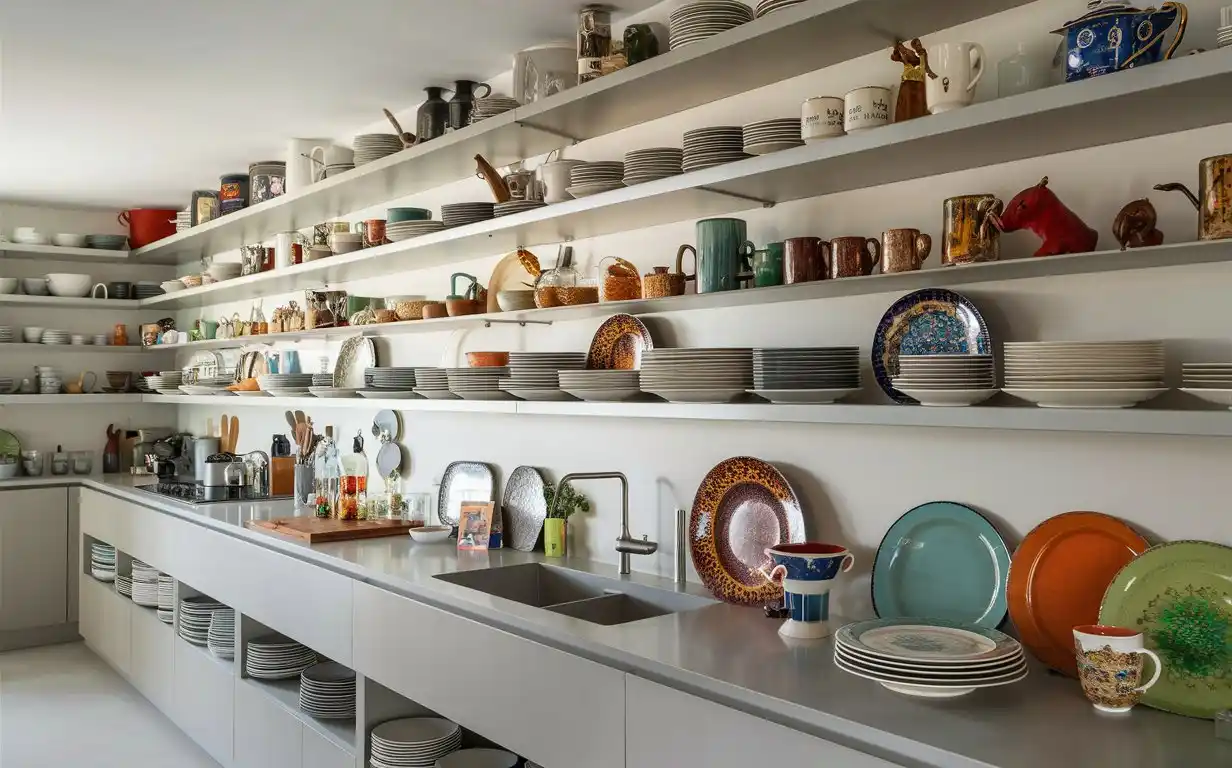
By learning how to style open kitchen shelves, you can turn them into a focal point in your kitchen, showcasing your unique style while keeping everything functional. Whether you’re going for a minimalist aesthetic or a more eclectic design, open shelving offers endless possibilities for creativity. The challenge is in striking the right balance between practicality and décor, which is what we’ll explore throughout this guide.
Benefits of Open Kitchen Shelving
Why should you consider open shelving in your kitchen? First and foremost, it makes your space feel larger and more open. Unlike traditional cabinets, which can make a kitchen feel closed off and heavy, open shelves invite light and airiness. They also offer easy access to everyday items, making cooking and entertaining more convenient. Another benefit of open kitchen shelving is the opportunity to display your most beautiful kitchenware, from elegant plates to colorful mugs.
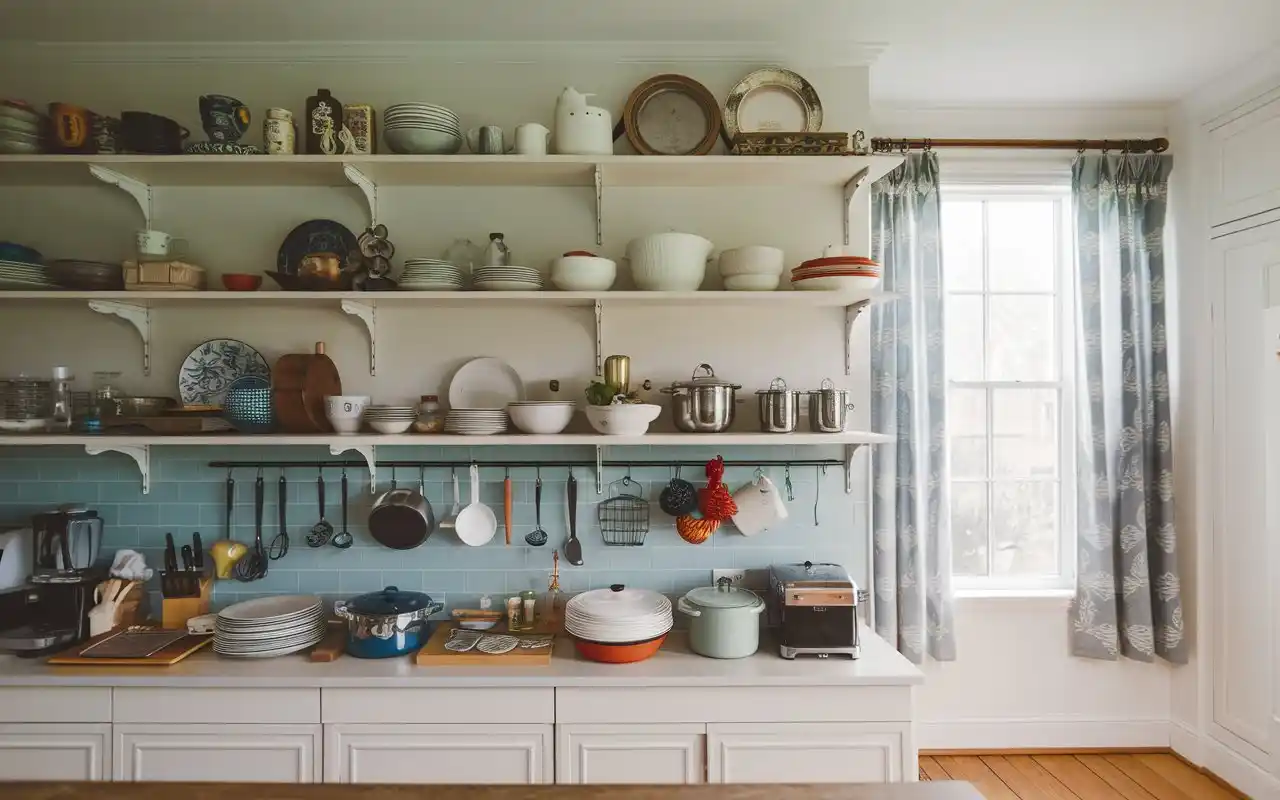
If you’re a fan of stylish jars or unique cookware, open shelving allows you to showcase these pieces as part of your kitchen décor. Additionally, because everything is visible, it encourages you to stay organized and clutter-free. Open shelving can also be a more budget-friendly option compared to installing upper cabinets, making it a win-win for many homeowners.
Preparing Your Kitchen for Open Shelving
Before you start styling your open kitchen shelves, it’s crucial to prepare your space. This involves cleaning, decluttering, and organizing to ensure you have a solid foundation. Start by removing everything from your shelves or the area where you plan to install them. Wipe down the surfaces and make sure they are dust-free and ready for new items. The next step is to declutter—this is an essential part of styling open shelves.
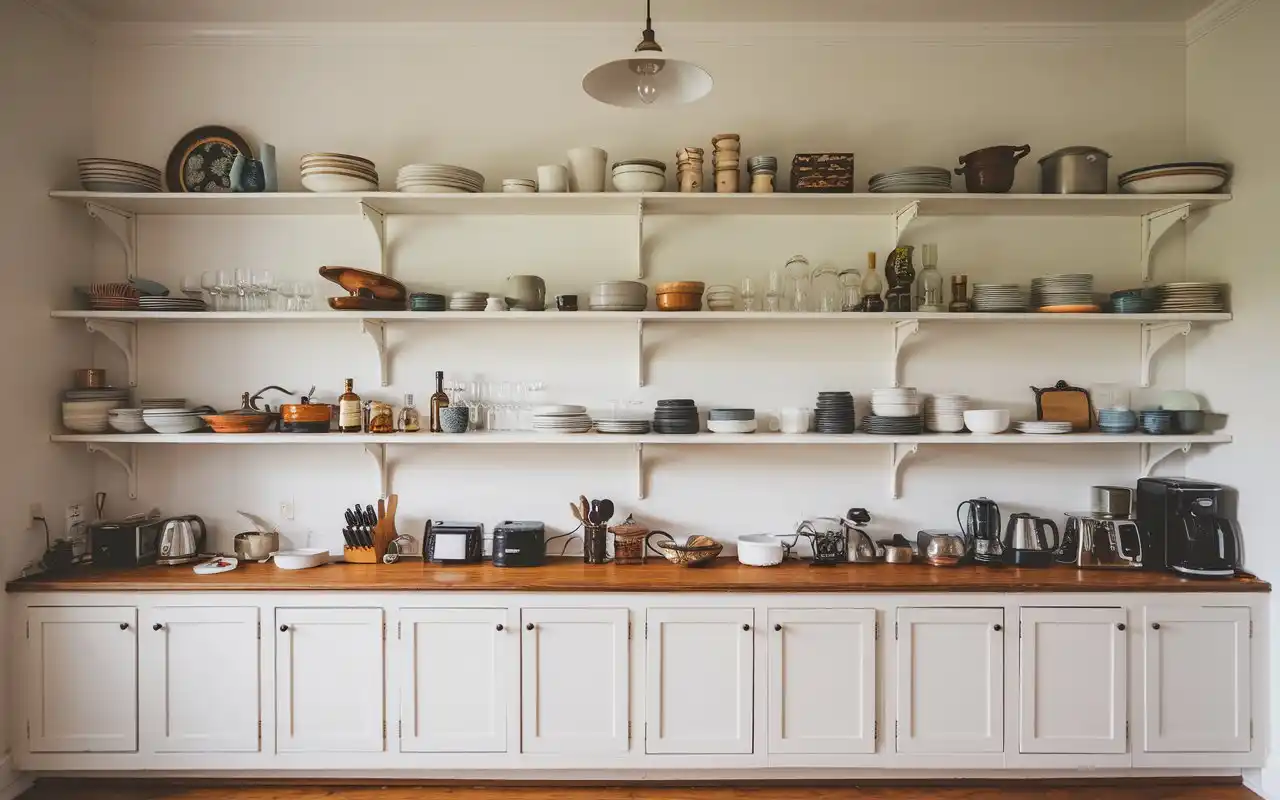
Go through your kitchenware and décor and separate items into categories: essentials, decorative pieces, and things you no longer need. Decluttering helps you avoid overstuffing the shelves and makes it easier to focus on the items that will enhance your design. Once your kitchen is clean and organized, you’re ready to move on to the styling process.
Decluttering and Categorizing
Decluttering is the cornerstone of successful open shelving. With everything on display, it’s important to curate your items carefully. Begin by categorizing your kitchen essentials and deciding what you truly need on a daily basis. Group similar items together, such as plates, bowls, or glasses, and consider whether they can serve both a practical and decorative function. Next, categorize your decorative pieces.
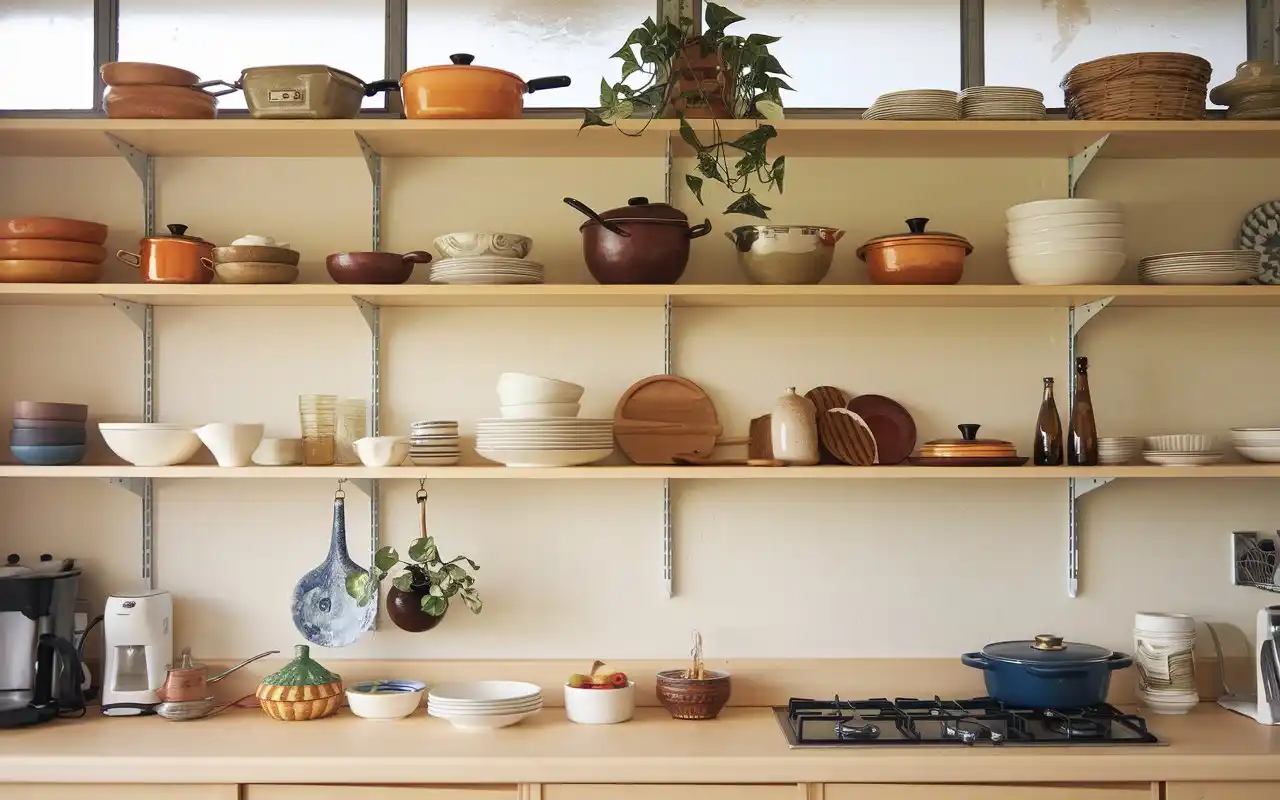
Think about vases, plants, or jars that complement your kitchen’s aesthetic. It’s also important to keep in mind that open shelves should not be overfilled. Minimalism is key—too many items will make the space look cluttered and chaotic. Aim for a balance between functionality and beauty, ensuring that the shelves are both useful and visually appealing. Proper categorization not only makes styling easier but also helps maintain an organized kitchen.
Design Concepts for Open Kitchen Shelves
Choosing the right design concept is crucial when it comes to styling open kitchen shelves. Start by deciding on a cohesive style that reflects the overall theme of your kitchen. Are you going for a modern, minimalist look? Or do you prefer a rustic, farmhouse vibe? The design concept should guide your choices when selecting items for your shelves.
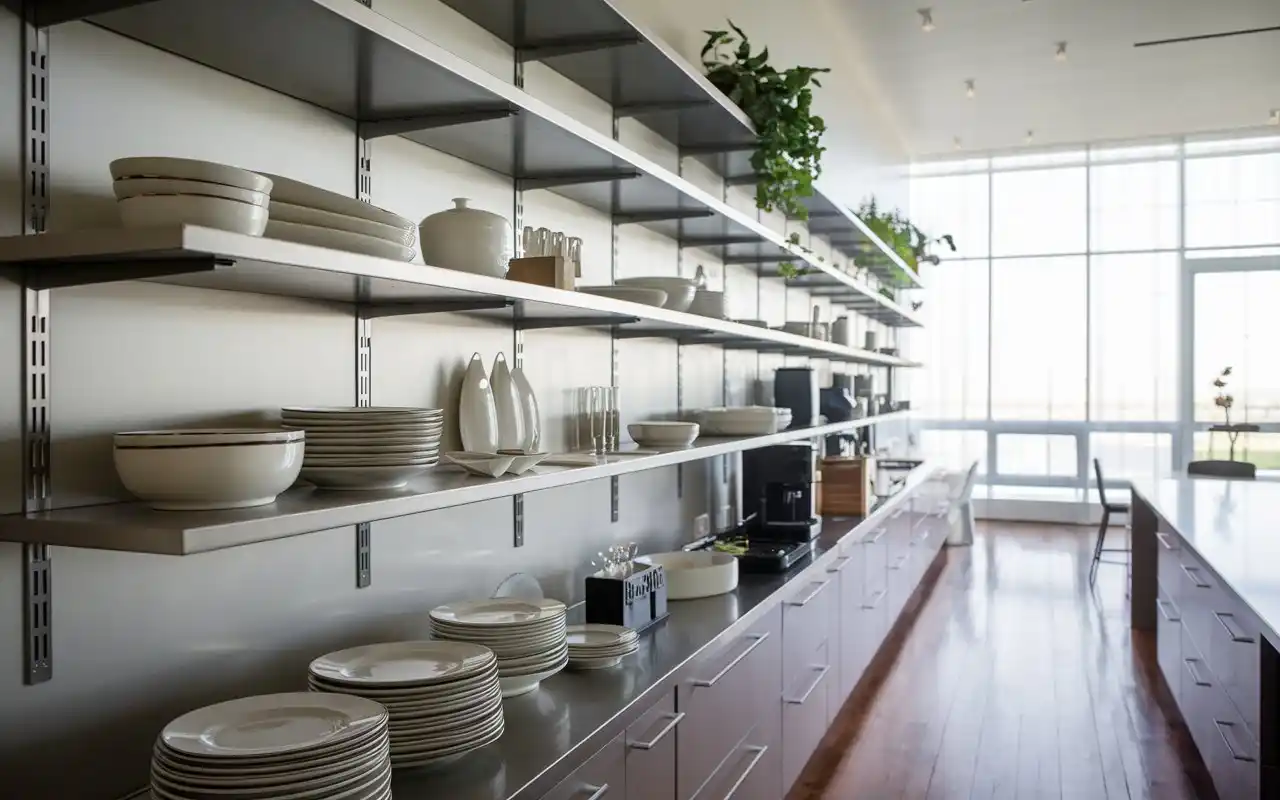
Think about incorporating complementary colors, textures, and materials. For example, a sleek, modern kitchen might feature monochromatic dishware on metal or glass shelves, while a more traditional kitchen could incorporate wooden shelves with a mix of ceramics and wicker baskets. Keep in mind that the design of your shelves should enhance the overall aesthetic of your kitchen, not overwhelm it. A well-thought-out design concept will make your shelves feel intentional and stylish.
Minimalist vs. Maximalist Approaches
One of the first decisions to make when styling open kitchen shelves is whether you want to take a minimalist or maximalist approach. A minimalist design typically involves fewer items, with a focus on simplicity and functionality. Think of neatly stacked white plates, clear glass jars filled with pantry staples, and a few potted herbs for a touch of green. In contrast, a maximalist design embraces bold colors, eclectic items, and layering.
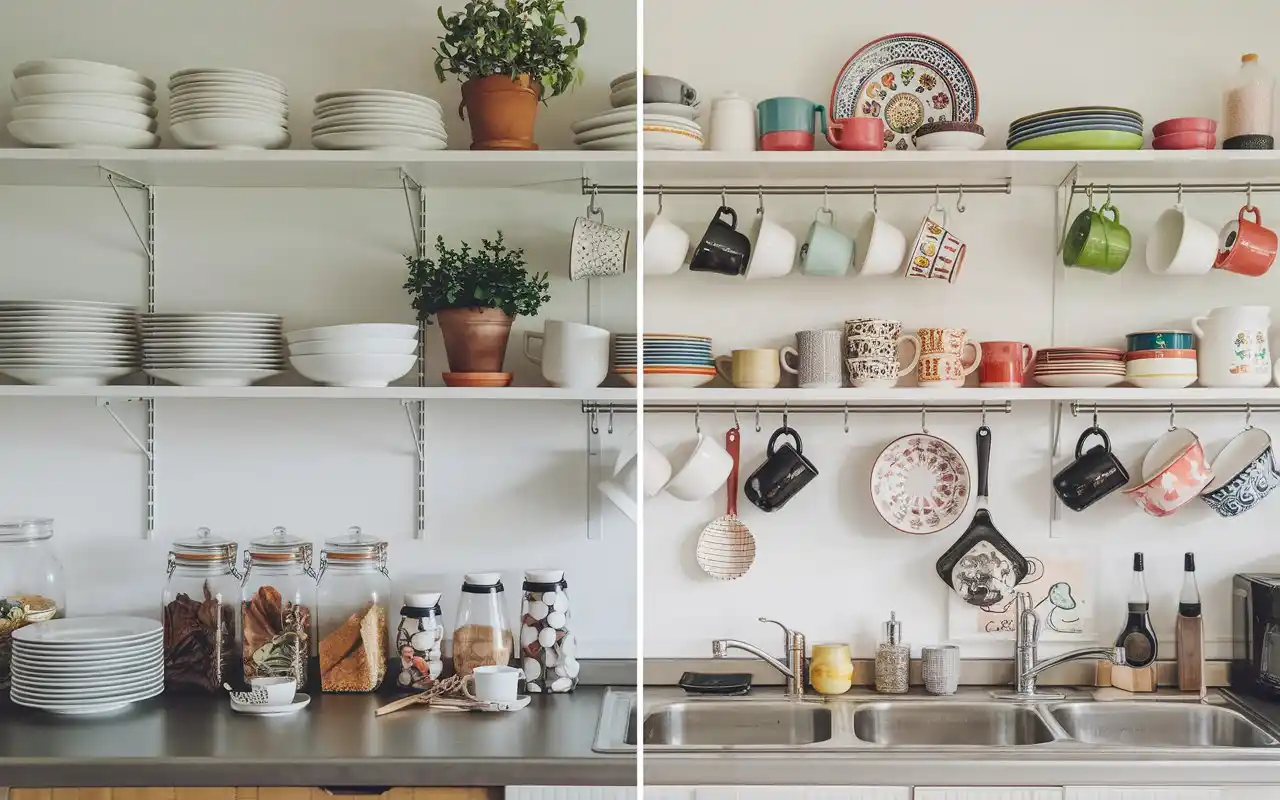
You might include mismatched dishware, colorful mugs, and various decorative pieces, all arranged in a way that feels dynamic and lived-in. Both approaches can be effective, depending on your personal style and the vibe of your kitchen. Minimalist shelves tend to feel cleaner and more organized, while maximalist shelves offer more personality and visual interest. Choose the approach that best suits your space and preferences.
Color Schemes and Materials
Choosing the right color scheme and materials for your open kitchen shelves is key to creating a cohesive look. Start by considering the existing color palette of your kitchen. If your kitchen is predominantly neutral, adding a pop of color through dishware or decorative pieces can add visual interest. Alternatively, if your kitchen already features bold colors, opt for a more subdued palette on the shelves to avoid overwhelming the space.
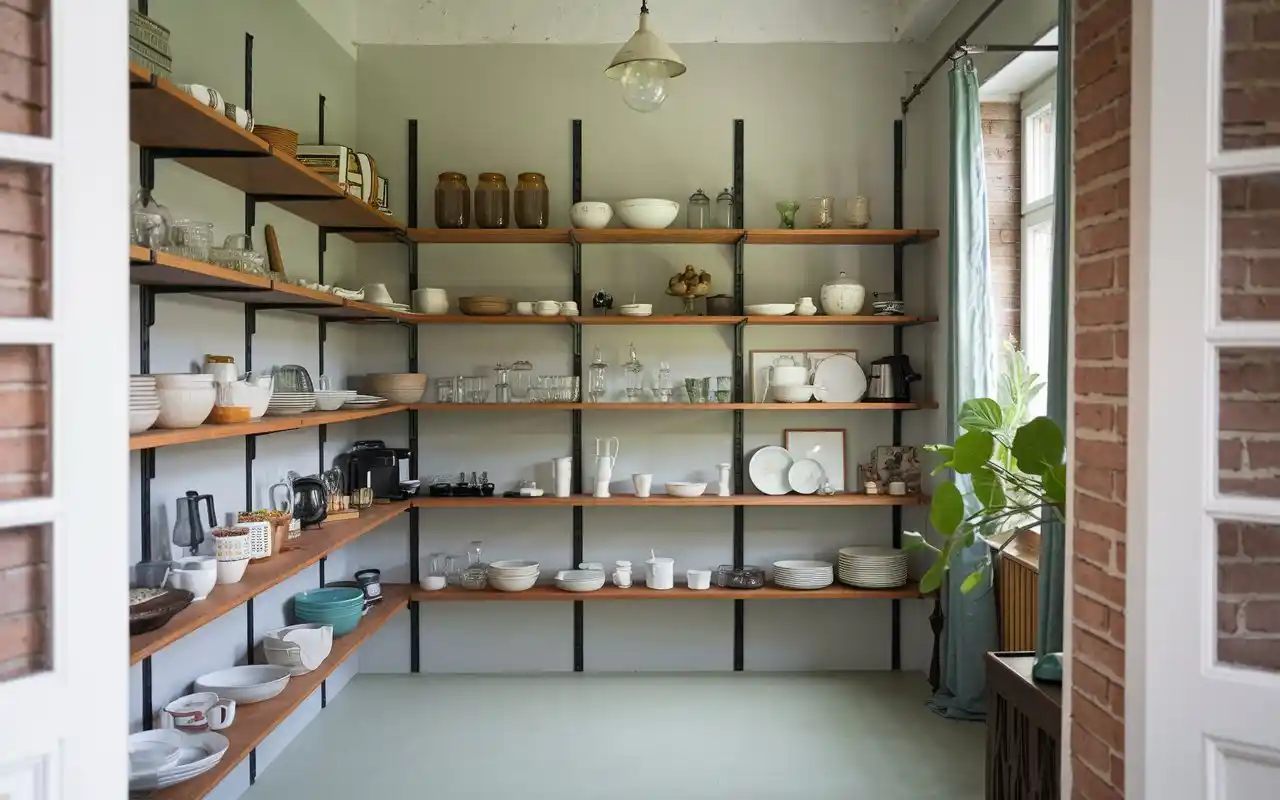
When it comes to materials, think about how they complement the rest of your kitchen. Wooden shelves work well in rustic or farmhouse-style kitchens, while glass or metal shelves are perfect for a modern or industrial look. Mixing materials can also add depth to your design. For example, you might combine wooden shelves with ceramic dishware and glass jars to create a balanced, multi-textured display.
How to Style Open Kitchen Shelves with Practicality
While open shelves are often treated as a design element, it’s important to remember that they also serve a functional purpose. When thinking about how to style open kitchen shelves, focus on combining practicality with aesthetic appeal.
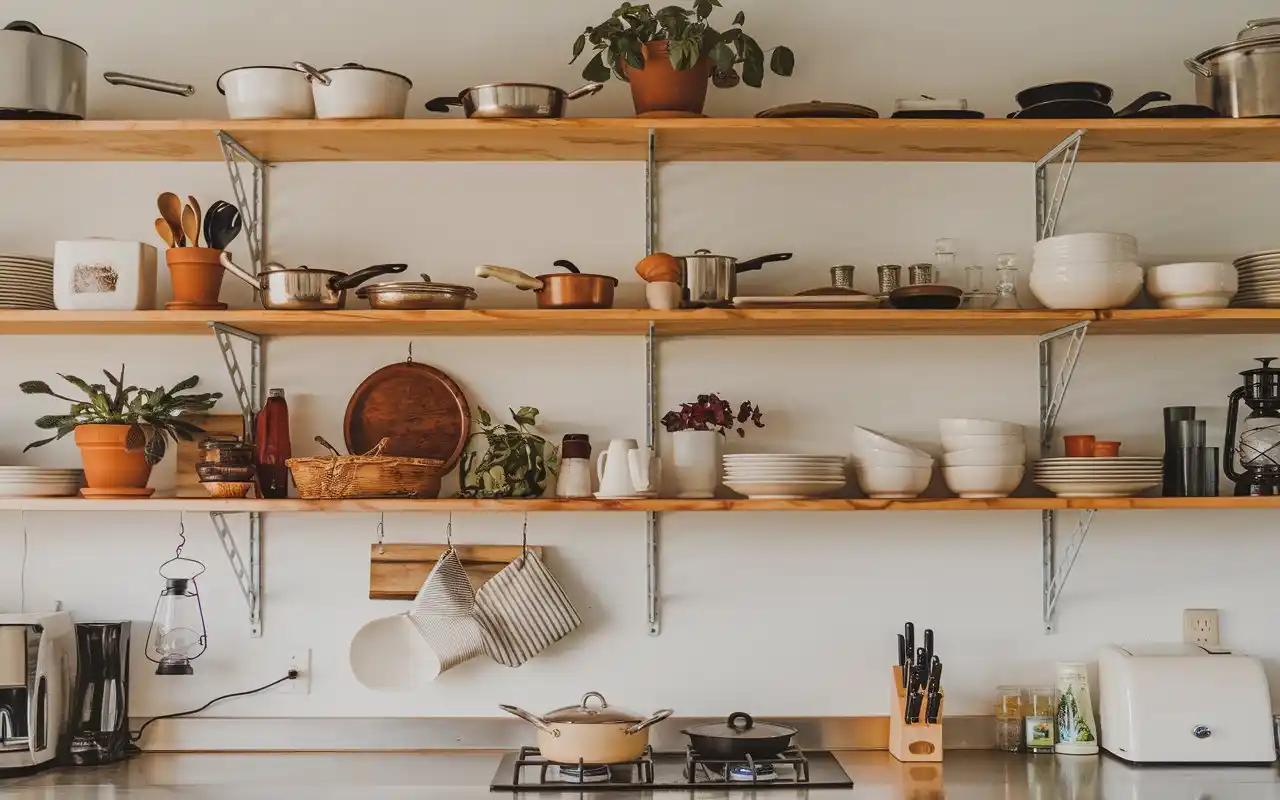
Start by displaying items that you use every day, such as plates, glasses, and utensils. These can double as décor when arranged thoughtfully. For example, stacking dishes in neat piles or placing utensils in decorative holders can make them look intentional rather than cluttered. It’s also helpful to keep frequently used items within easy reach, while reserving higher shelves for purely decorative pieces. By balancing function and style, you can create shelves that are not only beautiful to look at but also make your kitchen more efficient and user-friendly.
Functional Items as Decor
One of the best ways to style open shelves is by using functional items as décor. This approach allows you to make the most of your space while still keeping it visually appealing. Everyday items such as plates, bowls, and jars can serve as both practical kitchen tools and decorative accents. For example, consider displaying your dishware in stacks, grouping items by color or size for a more curated look.
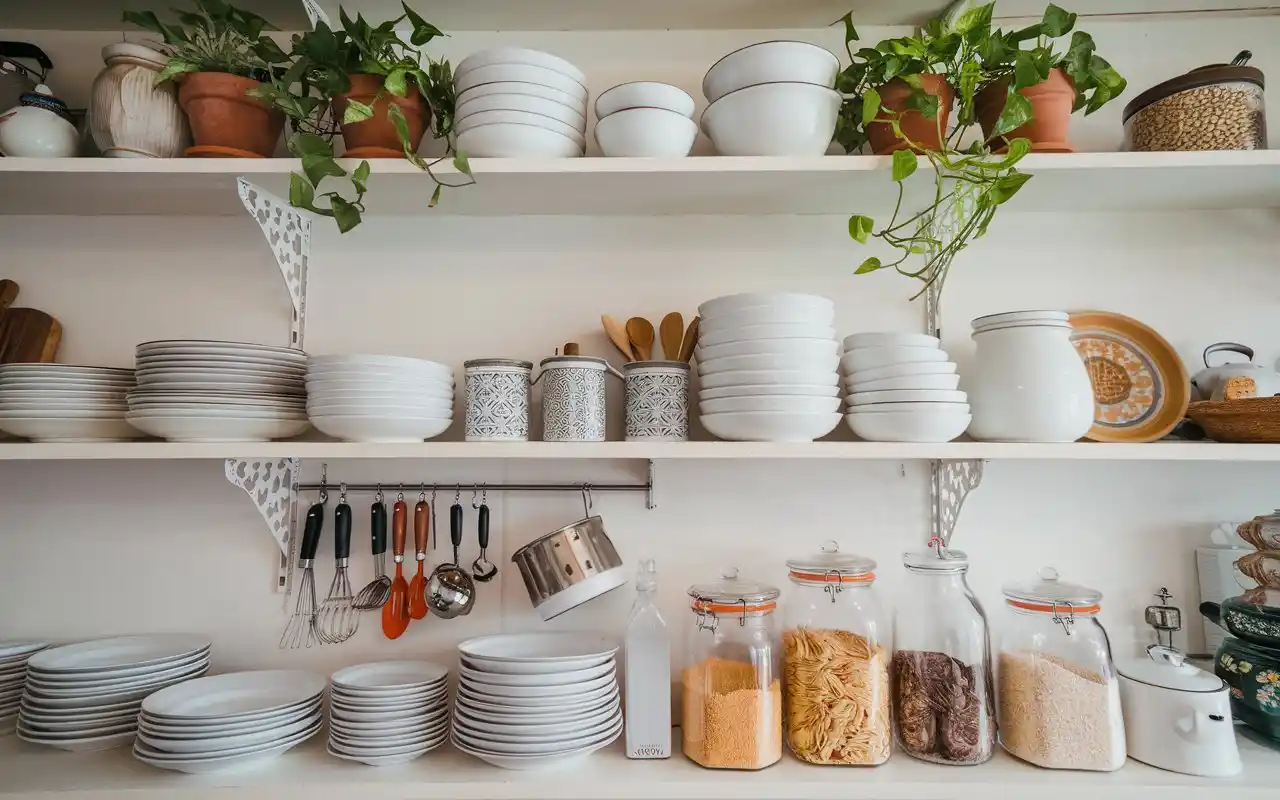
Clear glass jars filled with dry goods like pasta or rice can also add a rustic touch while keeping your pantry essentials within easy reach. Even utensils can become part of the décor when placed in attractive containers or hung from hooks. By treating functional items as part of your design, you can create shelves that are both stylish and practical.
Incorporating Plants and Natural Elements
Plants are a great way to bring life and freshness to your open kitchen shelves. Whether you opt for small potted herbs or trailing greenery, plants can add a pop of color and texture to your shelves, softening the overall look. Herb plants like basil, thyme, or rosemary not only look beautiful but are also practical for cooking.
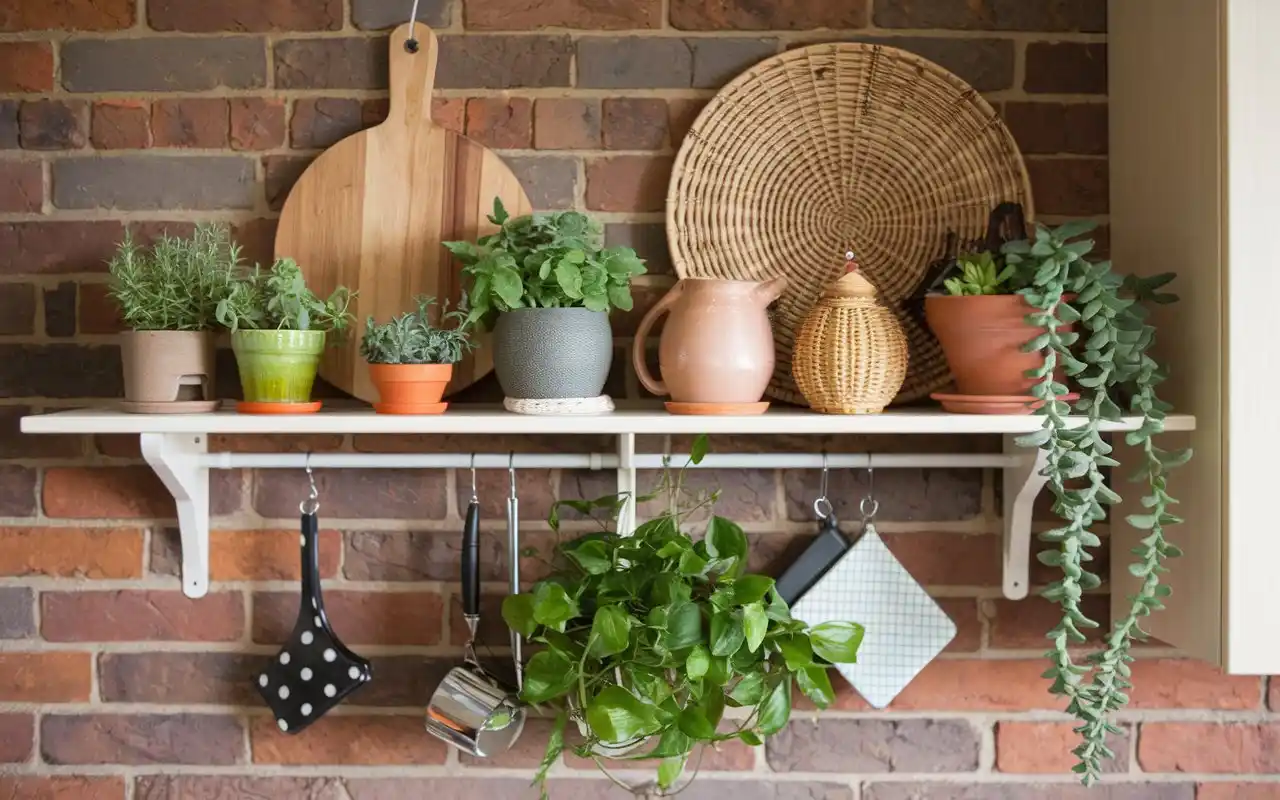
You can also incorporate other natural elements, such as wooden cutting boards, wicker baskets, or ceramic pots, to give your shelves a warm, organic feel. These natural touches contrast nicely with metal or glass items, adding balance and harmony to your design. Just be sure to choose plants that thrive in the conditions of your kitchen, such as those that can handle humidity or low light, to ensure they stay healthy and vibrant.
Tips for Layering Items on Open Shelves
Layering is an essential technique when styling open kitchen shelves, as it adds depth and visual interest. To create a dynamic look, think about varying the height, shape, and size of the items you display. For example, place taller items like vases or pitchers toward the back of the shelf and shorter items like bowls or plates in front. This not only creates visual layers but also ensures that all items are easily visible.
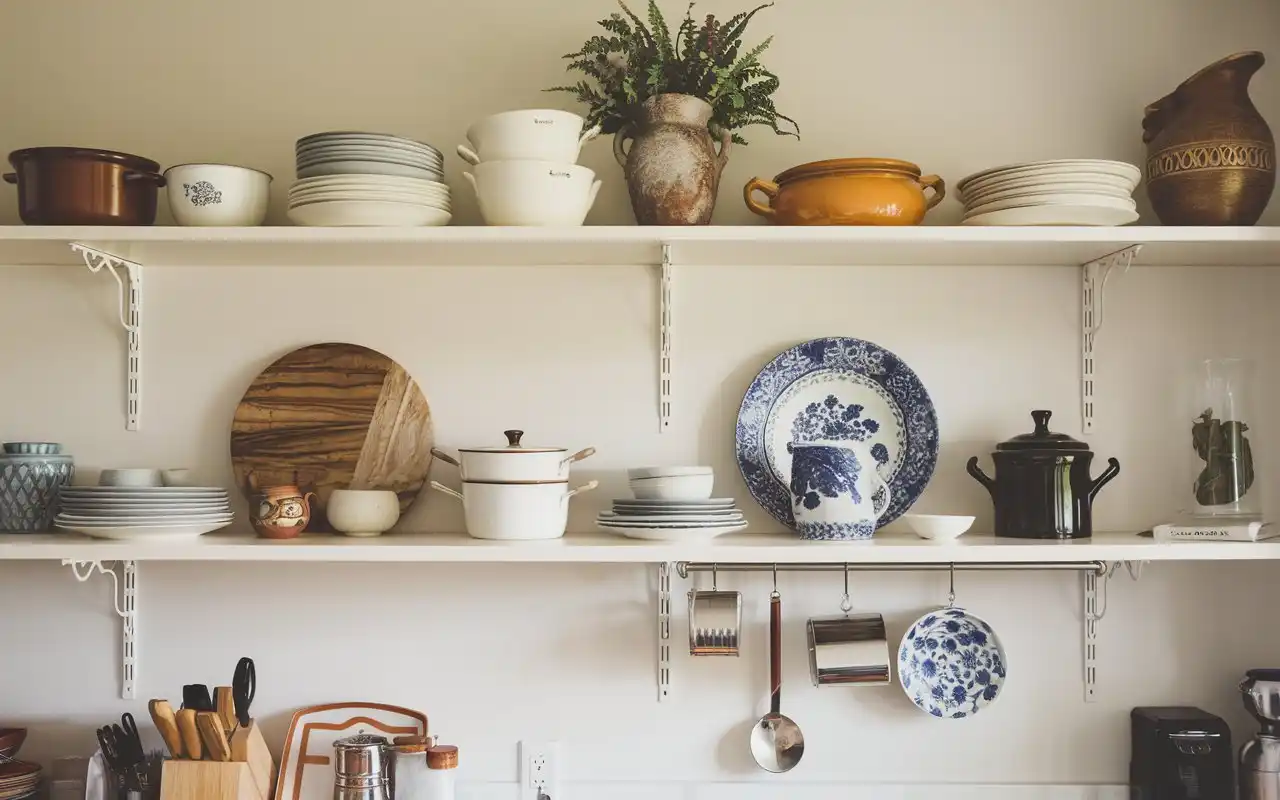
Grouping items by color or texture can also create a sense of harmony. For instance, you might arrange white dishware with glass jars and wooden accents for a cohesive, minimalist look. Don’t be afraid to play around with different arrangements until you find the one that feels balanced and visually appealing.
Arranging by Height and Weight
When styling open kitchen shelves, arranging items by height and weight is an effective way to create balance and stability. Start by placing heavier, larger items on the bottom shelves and lighter, smaller items on the top. This not only ensures that your shelves are sturdy and safe but also creates a visually pleasing hierarchy. For example, large mixing bowls or serving dishes can go on the lower shelves, while delicate glassware or decorative items can be displayed on the upper shelves.
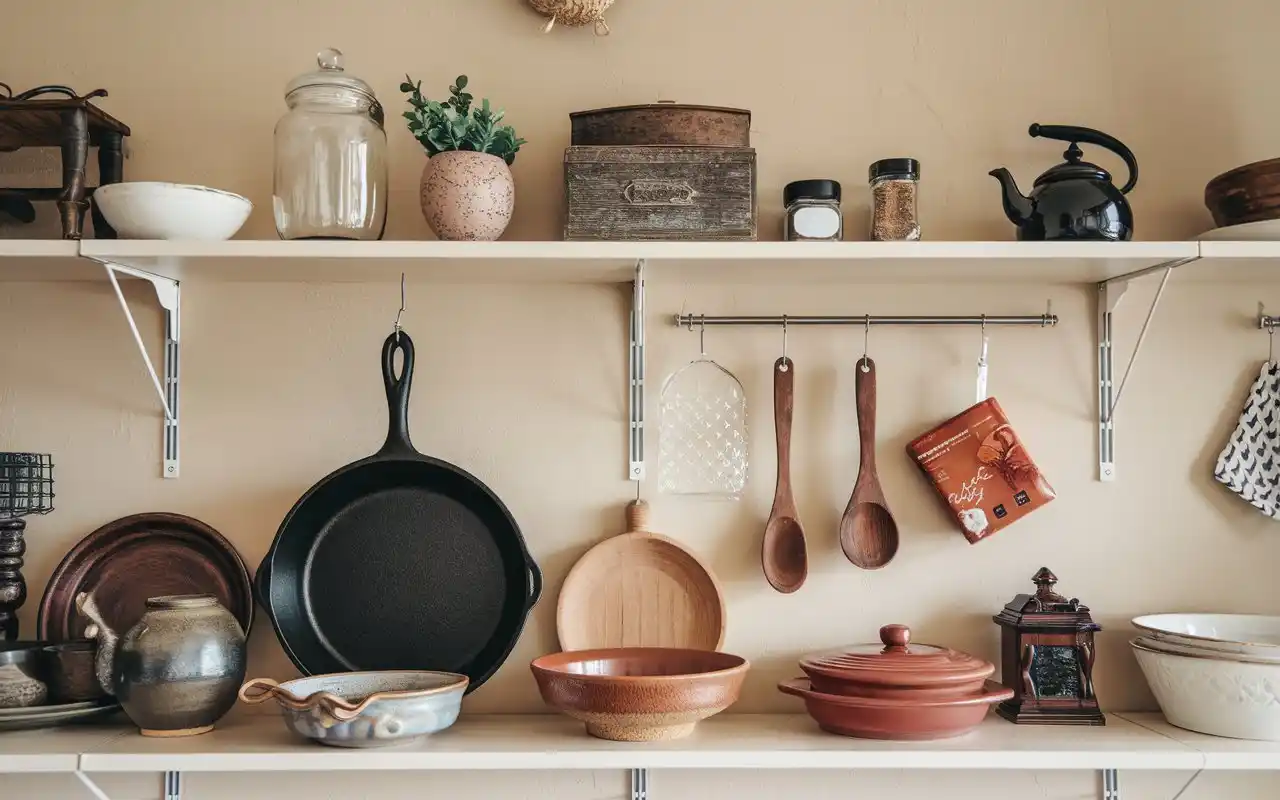
Varying the height of items on the same shelf can also add dimension. Tall pitchers or vases should be placed toward the back, with shorter items like plates or mugs in front. By considering both height and weight, you can create a well-balanced, aesthetically pleasing arrangement.
Grouping by Color and Shape
Grouping items by color and shape is a simple yet effective way to create a cohesive look on your open shelves. Start by selecting items that share similar colors or tones. For example, you might group white dishes together or display a collection of colorful mugs. This approach creates a sense of harmony and makes the shelves look more intentional.
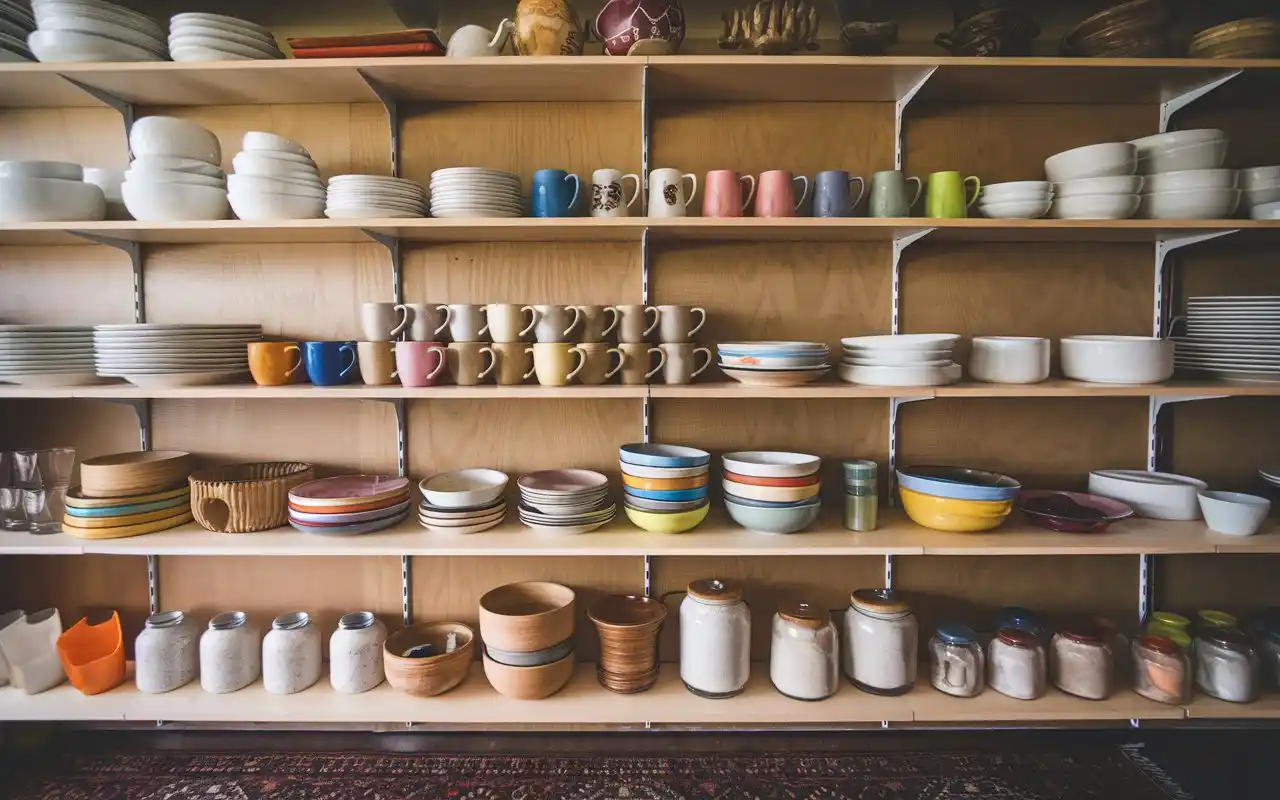
You can also group items by shape, such as stacking bowls or arranging jars of similar sizes in a row. Combining both color and shape in your arrangement adds visual interest without making the shelves look cluttered. Remember to leave some negative space between groups to avoid overcrowding the shelves. By carefully curating your items based on color and shape, you can achieve a polished, well-organized look.
Conclusion
Styling open kitchen shelves is both a creative and practical process. By carefully selecting and arranging your items, you can transform your kitchen into a space that reflects your personality and meets your everyday needs. Remember, balance is key—whether you’re going for a minimalist or maximalist approach, aim to create shelves that are both functional and visually appealing.
Take the time to experiment with different arrangements, play with color and texture, and incorporate personal touches like plants or handmade ceramics. With these tips in mind, you’ll be well on your way to mastering how to style open kitchen shelves for a kitchen that’s as beautiful as it is functional. Enjoy the process and watch your kitchen come to life with the perfect blend of style and practicality.

